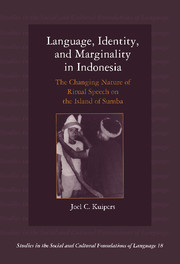 Language, Identity, and Marginality in Indonesia
Language, Identity, and Marginality in Indonesia Book contents
- Frontmatter
- Contents
- List of plates
- List of figures and tables
- Preface
- Acknowledgements
- Notes on orthography
- 1 Introduction
- 2 Place, identity, and the shifting forms of cultivated speech: a geography of marginality
- 3 Towering in rage and cowering in fear: emotion, self, and verbal expression in Sumba
- 4 Changing forms of political expression: the role of ideologies of audience completeness
- 5 Ideologies of personal naming and language shift
- 6 From miracles to classrooms: changing forms of erasure in the learning of ritual speech
- 7 Conclusions
- Notes
- Appendix
- References
- Index
- STUDIES IN THE SOCIAL AND CULTURAL FOUNDATIONS OF LANGUAGE
4 - Changing forms of political expression: the role of ideologies of audience completeness
Published online by Cambridge University Press: 05 July 2011
- Frontmatter
- Contents
- List of plates
- List of figures and tables
- Preface
- Acknowledgements
- Notes on orthography
- 1 Introduction
- 2 Place, identity, and the shifting forms of cultivated speech: a geography of marginality
- 3 Towering in rage and cowering in fear: emotion, self, and verbal expression in Sumba
- 4 Changing forms of political expression: the role of ideologies of audience completeness
- 5 Ideologies of personal naming and language shift
- 6 From miracles to classrooms: changing forms of erasure in the learning of ritual speech
- 7 Conclusions
- Notes
- Appendix
- References
- Index
- STUDIES IN THE SOCIAL AND CULTURAL FOUNDATIONS OF LANGUAGE
Summary
There is a distinctive kind of cheer that even a casual visitor to the island of Sumba is likely to witness. The cheerleader (usually a young man) leads with a high falsetto yodelling cry that falls in tone, like a whistling bombshell hurtling towards earth, which then explodes into a thunderous, concussive “yawao!” from the audience. In Weyewa ritual ideology, such hoorahs indicate a kind of ceremonial assent towards the proceedings. In a society where the recruitment of labor and human capital was historically a paramount expression of power, such seemingly inarticulate noises are crucial, if unacknowledged, indications of involvement and participation on the part of the conscripts. A series of three (or sometimes seven) of these shouts of applause are traditionally performed before setting off on some challenging group activity, such as carrying a pig to a feast, harvesting a rice field, or dragging a tombstone. Such shouts not only express the “spirit” on the part of the audience, to some extent they define the collective, if ephemeral, unity of the group itself.
These cheers are now used in campaign rallies, soccer matches, and to greet dignitaries and government officials. Such borrowing from the domain of work and “tradition” into the domain of politics is a hallmark of Suharto's New Order Indonesia. Bowen (1986), for example, has carefully shown how the metaphor of gotong-royong (“mutual self-help”) was imported from the vocabulary of agriculture into the realm of national politics and development.
- Type
- Chapter
- Information
- Language, Identity, and Marginality in IndonesiaThe Changing Nature of Ritual Speech on the Island of Sumba, pp. 67 - 94Publisher: Cambridge University PressPrint publication year: 1998
